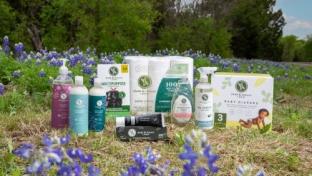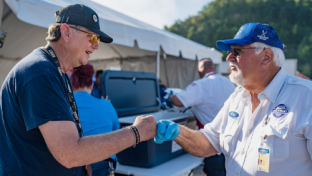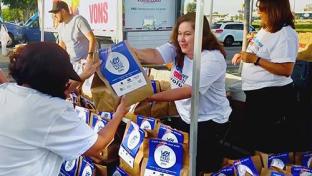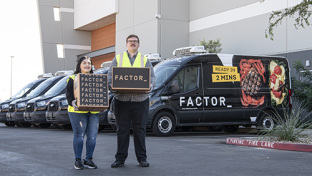Impact Awards Honors Companies Focused on the Greater Good
Compared with some of our other awards programs, which include Category Captains, Editors’ Picks and Top Women in Grocery, the Impact Awards program is a newbie, only in its second year. The reaction to it since its inception has been immense, however, with dozens of entries pouring in from a range of companies across the retail, supplier and solution provider realms. The main reason for this is that the grocery industry as a whole has plenty to share when it comes to helping to make the world a better place.
The Impact Awards honor exceptionalism in such key areas as Community Service/Local Impact; Diversity, Equity, Inclusion and Belonging; Educational Support/Learning Advancement; Ethical Sourcing/Supply Chain Transparency; Food Security/Nutritional Leadership; Sustainability/Resource Conservation; and Workforce Development/Employee Support. While we PG editors were overwhelmed by the high number of outstanding submissions from companies doing amazing things in these areas, we can’t really say we were surprised, as we’ve seen and reported on many examples all year round of grocers, suppliers and solution providers improving lives, creating opportunity and positively affecting the communities that they call home — and sometimes even further afield.
This year, we recognize the incredible efforts of honorees with 33 awards presented to 26 companies that are leading the way in making a tangible difference, whether that means reducing greenhouse-gas emissions across their operations, developing nutritional programs for underserved neighborhoods, or enabling hardworking associates and local customers to realize their educational dreams. We believe that such endeavors are just the beginning for these companies as they continue to seek innovative ways to remove obstacles, increase understanding and achieve ever-more-ambitious goals. PG salutes all of the recipients of the 2022 Impact Awards, and invites readers to find out about each one below.
Community Service/Local Impact
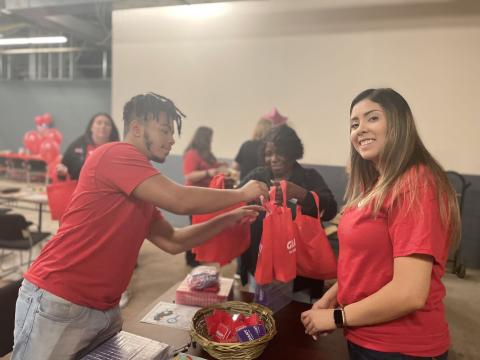
The Giant Co.
When The Giant Co. opens a new store, it seeks to partner with local community organizations, especially those supporting its three pillars of corporate social responsibility (CSR): eliminating hunger, changing children’s lives and healing the planet. A signature element of its approach to CSR is associate involvement: The retailer pairs active volunteer opportunities with its financial and product donations, aiming for at least one hour of volunteer service per associate per year.
To further boost volunteer and community involvement, the company introduced a paid volunteer program in 2021, which caused volunteer hours to skyrocket from 8,000 in 2020 to more than 28,000 in 2021. The program enables full- and part-time associates to volunteer at company-sponsored events and have a portion of their service hours treated as paid, scheduled work hours.
In 2022, during National Volunteer Month (April), the grocer ran a volunteer challenge to increase engagement and raise awareness of the volunteer program. The store with the highest number of volunteer hours in each region could donate $1,000 to a charity related to one of the company’s three CSR pillars. In just one month, associates logged a total of 6,350 volunteer hours, nearly matching the 7,079 hours logged in January, February and March combined.
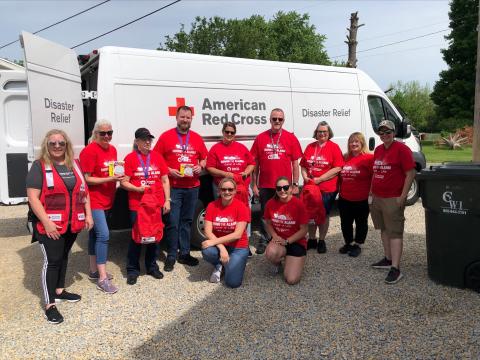
Schnuck Markets Inc.
Schnucks’ teammates always roll up their sleeves to volunteer for nonprofits throughout the markets/divisions they serve. In partnership with the American Red Cross and its Sound the Alarm initiative, the grocer’s associates volunteered at two events at which they installed 10-year battery-free smoke detectors for local residents.
Benefiting Beyond Housing of St. Louis, a collection drive held by Schnucks stores raised $150 of in-kind donations at each location. Employees delivered 63 donated boxes of household cleaning products to the Family Support Center, where they painted, changed light bulbs and replaced ceiling tiles. Further, to support the youngest members of the community, stores held a baby product collection drive to support Nurses for Newborns. Each store again added $150 in product, which helped the grocer collect 93 boxes.
Then there were associates from Evansville, Ind.-area stores who gave their time at the Tri-State Food Bank, assisting with product sorting. Additionally, a collection drive for household cleaning products and food items was held to benefit Ronald McDonald House and its mission to provide a home away from home for families of seriously ill children. Each store once more contributed $150 worth of in-kind donations. After delivering 73 boxes to a local Ronald McDonald House, teammates helped organize and clean its warehouse.
Diversity, Equity, Inclusion and Belonging
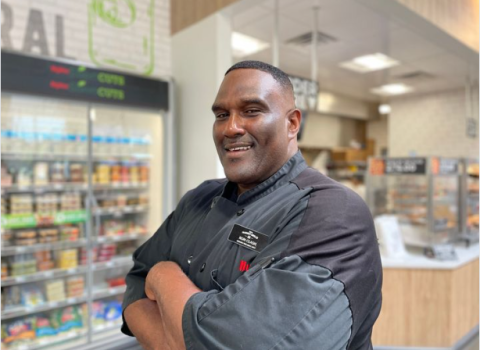
Hy-Vee Inc.
Understanding that diversity, equity, inclusion and belonging span many business areas, Hy-Vee has focused on its workplace, marketplace and workforce.
To foster a more equitable workplace and workforce, the Iowa-based grocer began a diversity and inclusion training requirement for all employees and introduced a program called Cultural Conversations to spur discussions on timely topics. In the area of recruitment, the retailer rolled out the Perfect campaign featuring videos that represent the diversity of Hy-Vee employees.
To give back to the marketplace, Hy-Vee focused on several areas of community engagement. The retailer pledged 5,000 hours of volunteer service to nonprofit organizations to honor Black History Month, for instance. To protect people in its service areas, the company worked with partners to distribute COVID-19 vaccines in historically underserved neighborhoods.
To ensure that its products reflect a diverse marketplace, Hy-Vee works to create a pipeline of diverse suppliers by hosting quarterly brand summits where minority- and women-owned small businesses can pitch their products to sell at the grocer’s stores.
For these and other efforts, Hy-Vee won an inclusion award from the Greater Des Moines Partnership in 2021 and was recognized by the West Des Moines Chamber of Commerce in that organization’s inaugural Diversity, Equity & Inclusion Workplace Excellence Awards.
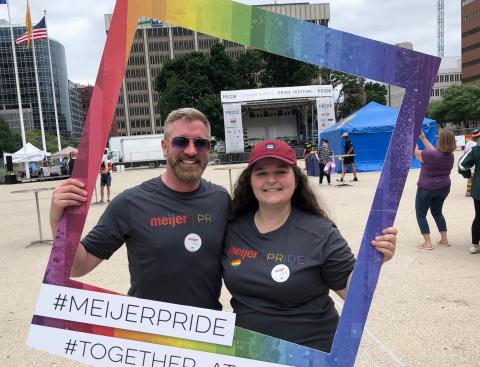
Meijer Inc.
For Meijer, the notion of community is key to its diversity, equity, inclusion and belonging (DEI&B) commitments.
Although the company has a demonstrated history of embracing diversity efforts, Meijer has recently amplified opportunities for team member resource groups (TMRGs). Those groups now include the Meijer Disability Awareness and Advocacy Group (mDAAG), Women at Meijer, YoPro (young professionals), mVets (veterans), Meijer Pride, MOSAIC (team members of color), and Meet@Meijer (new team members). The company reports that membership in TMRGs has grown by 50% in the past year alone.
To bring its employee communities together, Meijer hosts company-wide programs such as a recent Stronger Together: Meijer Unity and Community event. Locations were encouraged to demonstrate their dedication to unity and community in a way that was unique to each store. Meijer also keeps all team members up to date on DEI&B through regularly published newsletters.
Beyond internal initiatives, Meijer partners with minority-owned businesses to enhance its supplier diversity. The retailer has held several supplier diversity summits that have resulted in the addition of 215 diverse vendors. Meijer extends its work into the community at large, too, investing nearly $12 million in organizations, structures and people addressing racial inequities throughout its multistate service area.
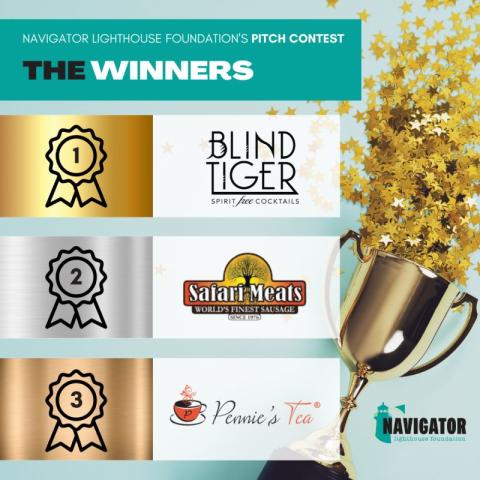
Navigator Sales and Marketing
During the civil unrest of 2020, food broker Navigator looked at its portfolio and realized that it didn’t represent enough diverse-owned brands. So, it set out to increase supplier diversity on grocery store shelves across America by finding brands that needed its support. As a result, Navigator increased its portfolio of women- and diverse-owned brands, which now account for 60% of its portfolio of CPG brands.
The company also started a 501(c)(3) foundation. Comprising 25 entrepreneurs and focused on education, Navigator’s foundation instructs brands on how to be successful at grocery. To help with the training, the company enlists partners such as NielsenIQ, ECRM/RangeMe, KeHE, Costco, Albertsons Cos., Wakefern and Morgan Stanley. The Navigator Lighthouse Foundation creates a holistic success system for women and minority CPG entrepreneurs to launch and succeed in the grocery industry. Combining the successful model of Navigator’s brokering process with unique areas of support and focus has paved a tailored path for minority and women business owners to get their products sold at grocery stores.

Target Corp.
Target’s commitment to diversity, equity, inclusion and belonging covers not only its associates, departments and stores, but also its suppliers, customers and the communities that it serves. The retailer is working to leverage its size, scale and resources across its business to accelerate change and progress through several initiatives, including a pledge to spend $2 billion with Black-owned businesses by the end of 2025. So far, Target has doubled the number of Black-owned brands in its assortment — it now offers more than 100 across every major category. The retailer further supports diverse suppliers and underrepresented businesses by investing capital, opening access to new markets, sharing expertise and engaging in sponsorships.
The retailer has also been active in building up BIPOC-owned businesses in the Twin Cities and beyond by pledging 10,000 hours of pro bono consulting services. So far, more than 100 Target team members have delivered nearly 4,000 hours of services and supported 25 projects spanning services from strategic planning and sourcing to web design and marketing. Target also unveiled its Forward Founders accelerator program in 2021 and has since mentored more than 40 early-stage food and beverage brands across three classes.
Educational Support/Learning Advancement
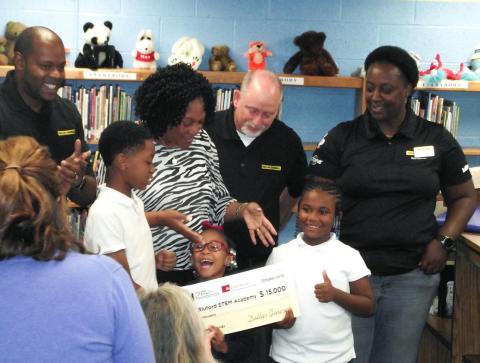
Dollar General Corp.
The Dollar General Literacy Foundation (DGLF) was founded in 1993 by then-CEO Cal Turner Jr. to honor his functionally illiterate grandfather, company co-founder J.L. Turner, and to support others’ educational journeys. Espousing the belief that everyone deserves an equal opportunity to receive a basic education, the foundation has invested in and provided financial assistance to literacy programs to increase access, enhance the quality of instruction, and inspire and advance innovation. To date, DGLF has awarded more than $216 million to further literacy and learning, enabling more than 15.2 million people to achieve their educational goals.
The foundation’s programs include grants to help adults, families and youths in need of literacy assistance through such means as high school equivalency preparation; English-language acquisition; adult education instruction; children’s education; the purchase of new technology or equipment, books, materials or software at schools, public libraries and nonprofits; summer reading programs; and helping public school libraries rebuild after disasters.
In March 2022, DGLF revealed about $5 million in grants to five national organizations to further support students and educators: Save the Children, the Barbara Bush Foundation for Family Literacy, DonorsChoose, Discovery Education in Partnership with the National Afterschool Association, and the Children’s Defense Fund.
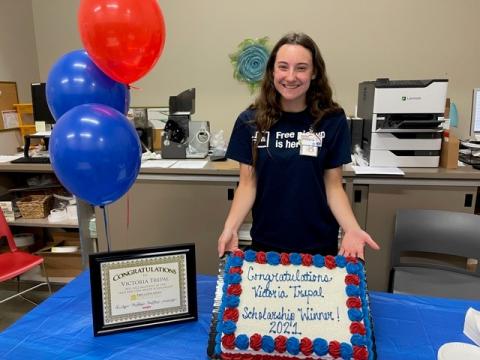
Meijer Inc.
Meijer has ramped up its educational support big time. In 2022, the Midwest retailer revealed that it’s bolstering its educational benefits to give every team member a chance to earn a free education.
Among other initiatives, Meijer is partnering with four online universities — Colorado State University Global, University of Maryland Global Campus, Walden University and Western Governor’s University — to provide bachelor’s degrees to team members. The free educational programs, which allow for flexible scheduling and self-paced courses, include more than 40 eligible fields of study. The program also features academic advisors who can coach students during their educational journeys.
In addition to college programs, Meijer provides support for team members to pursue a free high school diploma, GED or English-language learners’ program. The retailer has more than doubled its tuition reimbursement to the IRS maximum of $5,250 each year for all team members for traditional brick-and-mortar educational institutions.
In the name of its founders, Meijer awards the Fred and Lena Meijer Scholarship to help team members offset the cost of a traditional education. That scholarship can be used in conjunction with tuition reimbursements. Now in its 46th year, the program recently bestowed $10,000 scholarships on four Meijer team members and $5,000 on 106 recipients.
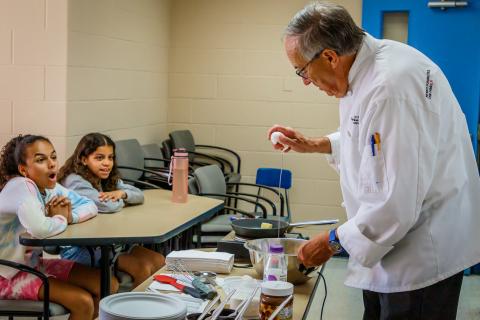
Rich Products Corp.
In a city facing high childhood poverty and low graduation rates disproportionately affecting people of color, building the next generation of leaders is among Rich Products Corp.’s core values and directly aligns to the work that the Say Yes organization does to address and overcome the financial, academic, social and health obstacles that Buffalo, N.Y., public-school students face. That’s why Rich’s recently pledged $1 million to continue supporting the work of Say Yes Buffalo.
Since 2012, Say Yes Buffalo has partnered with the Buffalo public-school system to increase graduation rates by providing students with a comprehensive support system and post-secondary tuition scholarships. In the years since its launch, Say Yes Buffalo has supported more than 8,000 students, including more than 2,000 college-bound Say Yes scholars.
Rich’s support extends to creating meaningful connections with students through mentorship and on-the-job experiences at Rich’s Buffalo headquarters. Rich’s also engages in an active relationship with Say Yes through board service and by acting as a conduit for meaningful connections between other educational partners within and around Buffalo. Additionally, the company creates career exposure and awareness for Say Yes students. For example, this past summer, one of Rich’s culinarians delivered a multiweek culinary series for summer students.
Ethical Sourcing/Supply Chain Transparency
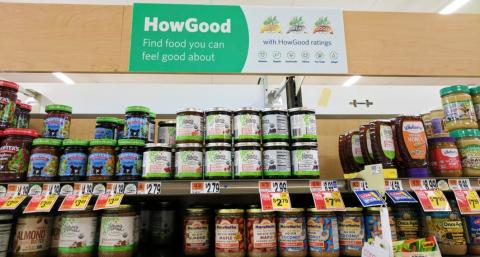
Giant Food
Giant Food’s efforts to ensure greater product transparency fall into four key categories: empowering customers to shop based on environmental and social impact, ensuring ethical and just supply chains, conserving and regenerating natural resources, and advancing circular and safe products/packaging.
The grocer’s easy-to-use environmental social impact rating system, powered by HowGood, analyzes each product ingredient against environmental and social criteria, including farming practices, treatment of animals, labor conditions and chemical use, making it easy for customers to make informed choices when they shop. Additionally, all of Giant Food’s store-brand products will feature clear on-pack bioengineered food disclosure well ahead of the federal bioengineered labeling.
Giant Food also maintains a robust animal welfare policy and upholds its human rights policy that all people involved in the food supply chain should be treated fairly, justly and with respect, as well as conserving and regenerating natural resources by promoting regenerative agriculture and sourcing a wide array of certified-sustainable products, including such key commodities as seafood, coffee, cocoa, tea, palm oil, soy and wood.
Further, Giant Food maintains a stringent sustainable chemistry policy, is moving toward 100% sustainable plastic packaging, and has instituted a leading sustainable seafood policy that covers a wide range of products.
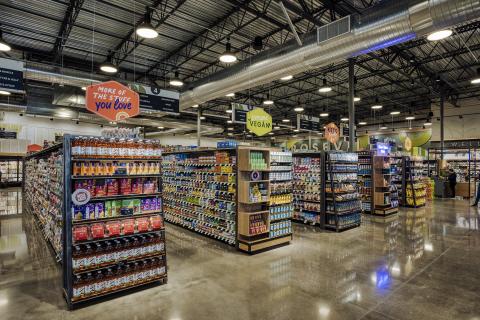
Raley’s
Believing that customers should know exactly where their food comes from, Raley’s works with a small number of trusted, fully vetted meat, poultry and egg suppliers, including many local farms, all of which share its deep commitment to ensuring safe, healthy and humane conditions throughout the supply chain.
Beyond that, Raley’s closely monitors its private label sourcing partners’ adherence to its rigorous standards and to government regulations. Its quality assurance team manages and digitally scales out this complex process using the Collaborate+ system, a configured version of the CMX1 for Grocery platform from CMX.
With Collaborate+, Raley’s has turned previously manual tasks into digitized, automated actions. During the supplier vetting, onboarding and review processes, the Collaborate+ portal collects acknowledgments, signed documents, audits and certifications to manage vendor compliance across multiple programs and regulations. All vendor-supplied information is reviewed and verified against industry and regulatory standards through an automated review and approval workflow managed within Collaborate+.
Raley’s will reject suppliers during onboarding for not meeting standards, or pause onboarding until corrective actions are taken. For vendors without mature policies and procedures, the grocer will conduct on-site visits, observe the operation’s process, review programs, and provide feedback on meeting and maintaining Raley’s standards.
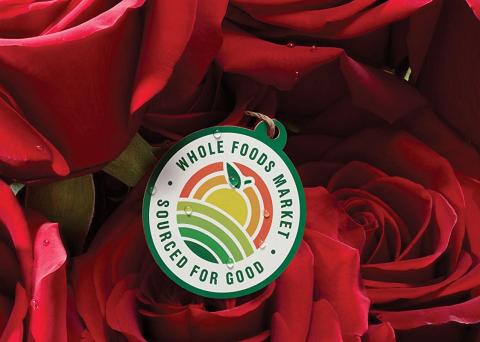
Whole Foods Market
Ethical sourcing has been a goal for Whole Foods since it first opened its doors in 1980, and the company believes that its customers should know where their food comes from. As such, the grocer continuously works to promote supply chain transparency, fair trade and workers’ rights in the products that it buys and sells. Through its Sourced for Good program, Whole Foods looks to build thoughtful, long-term partnerships with partners that it can trust, and collaborates with farms, producers and international third-party certifiers to ensure that participating suppliers generate positive impacts for workers, their communities and the environment.
Additionally, Whole Foods has transitioned all 365 by Whole Foods Market tea to be certified by either Fair Trade USA or Rainforest Alliance. All of that brand’s packaged coffee is responsibly sourced and certified according to an approved third party, and 365 chocolate bars, chocolate chips and baking chocolate are certified by Fair Trade USA. Additionally, Whole Foods is a member of Conservation International’s Sustainable Coffee Challenge, a collaborative effort of companies, governments, NGOs, research institutions and others to create a more sustainable coffee sector.
Food Security/ Nutritional Leadership
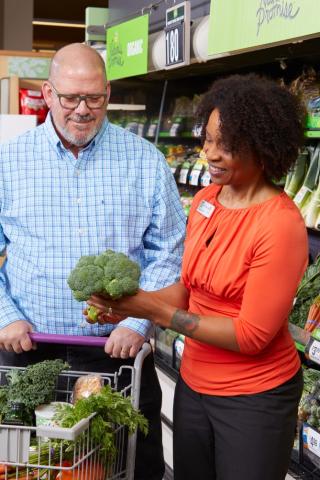
Giant Food
Giant Food’s Healthy Living Team (HLT) is a forward-facing service that supports, encourages and connects the grocer’s local communities and associates to foods and services that improve their health and well-being. Consisting of 11 licensed nutrition professionals, the HLT not only provides free nutrition services, but also works to increase knowledge of healthy food and its benefits, the affordability of food in underserved areas, and access to healthy food in the communities served by the retailer’s stores.
Since the 2018 launch of a neighborhood health improvement program in Ward 8 of Washington, D.C., a community with the highest rates of poverty and of chronic disease in the district, Giant Food has invested $2.4 million in improving health outcomes in the area through programs such as Produce Rx, which began in 2019 and has tripled in scope over the past three years.
In 2021, the HLT expanded Giant Food’s nutrition incentive programs into Prince George’s County, Md., and revealed the first Ward 8 Healthy Living Microgrant recipients.
Additionally, working with local organizations, the HLT and the Giant Food Business-to-Business Team have collaborated on the development of healthy, affordable meals that are delivered directly to participants, and education outreach programs on nutrition.
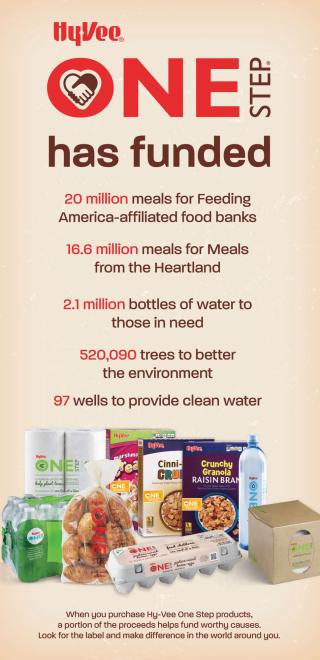
Hy-Vee Inc.
To combat the very real problem of food insecurity, Hy-Vee shored up its support of food banks in a number of ways over the past year. Indeed, the retailer has proved to be a pivotal link between consumers in need and healthy, nutritious meals.
One of those efforts was the creation of Food Bank Fridays, a campaign through which customers could donate $1 or $5 at their local Hy-Vee or Dollar Fresh Market store, or online. As part of that campaign, Hy-Vee and its customers have raised $1 million for local food banks.
In another way of raising awareness of the need to assist local food banks, Hy-Vee started a social media campaign highlighting food banks that benefit from donations and assistance. That program was managed by engaged Hy-Vee employees.
The grocer also donates products to improve access to food. Over the past year, Hy-Vee gave out nearly 7,500 hams to families in need and delivered more than 17 semi loads of food donations to food banks. Through its broader One Step philanthropic program, the grocery chain has provided 2.1 million water bottles. Beyond the local communities it serves, to assist on an international basis, the retailer packaged 300,000 meals for residents of war-torn Ukraine in 2022.
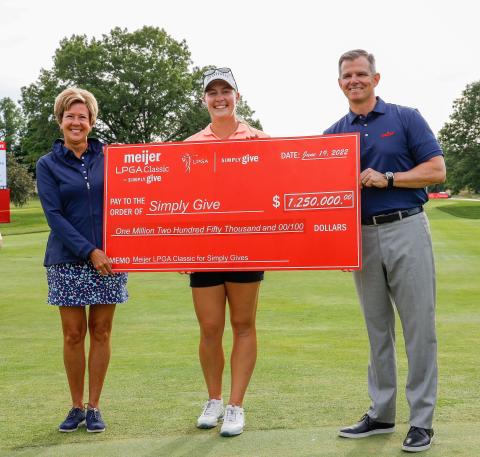
Meijer Inc.
Meijer gives back at least 6% of its profits each year, including a substantial amount of funds for hunger relief. Helping needy families, a longtime pillar of the retailer’s charitable efforts, is reflected in its impactful forms of assistance.
Case in point: Meijer’s year-round Simply Give program that provides foods to pantries across the Midwest. Customers can purchase a $10 donation card at the in-store or online checkout point to be converted to a food-only gift card for donation to area food banks; on select days, Meijer will match or double match customer donations.
Since 2008, the program has generated more than $69 million through contributions from shoppers, team members, the company and Meijer’s food bank partners. The Meijer LPGA Classic golf tournament also supports that cause, raising $1.25 million in 2022 alone and more than $8.65 million over the past nine years.
In addition to its fundraising initiatives, Meijer runs a food rescue program that provides food that would otherwise go to waste to local food pantries. Further, to make it easier for pantries to serve their clients, Meijer has given more than 100 reconditioned tractors and trailers from its fleet to nonprofit groups transporting food.
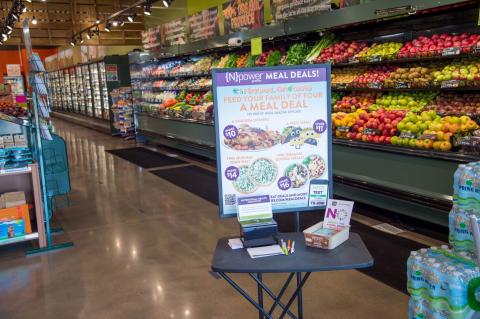
Natural Grocers
Natural Grocers partners with local food banks, donating 5 cents per shopping trip each time a customer brings their own bags. The grocer also reduces prices as products approach their sell-by date, and then donates unsold products (of verified quality) to local food banks. Company in-kind food and product donations totaled more than $3 million in fiscal year 2021.
Meanwhile, nutrition education is one of Natural Grocers’ five founding principles. It’s the only national chain to support full-time nutritional health coaches (NHCs) in all stores, with the primary responsibility of providing free nutrition education to customers and the community. NHCs provide educational activities such as classes, lectures, seminars, health fairs, community events and store tours. In the past five years, more than 30,000 people optimized their health through free coaching sessions, about 8,000 free in-store nutrition classes were held, and more than 115,000 attendees were educated and empowered.
Natural Grocers’ programs are supplemented by outside experts and print and online materials. Its Health Hotline, published 11 times in fiscal year 2021, includes in-depth articles on health and nutrition, recipes, and profiles of sale items. The free publication is available by mail, in stores and online. The company plans to continue its mission of knowledge, access and affordability.
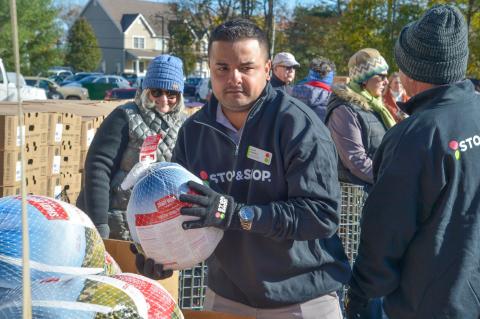
The Stop & Shop Supermarket Co.
Stop & Shop has a long-standing history of giving back to the neighborhoods that it serves, with a focus on fighting hunger. In 2021, the company undertook research and situation analysis on the extent of food insecurity in conjunction with community food banks and food pantries across New York, New Jersey, Connecticut, Massachusetts and Rhode Island to help prepare for one of its biggest annual fundraisers. The Turkey Express Program is a month-long initiative dedicated to donating meals to hunger relief organizations throughout the grocer’s footprint each year ahead of the Thanksgiving holiday.
Stop & Shop aimed to provide more than 22,000 turkeys to families, food banks and food pantries in the Northeast to help meet the need for holiday assistance caused by the pandemic. During its donation events, Stop & Shop provided visuals of the loading, transporting and distribution of frozen turkeys, and the company also had a helping hand from local professional sports partners, including the New York Giants, the New Jersey Devils and the New York Islanders. Stop & Shop was able to use these partnerships and the resulting media attention to successfully promote awareness of food insecurity, the need for food assistance, and the value in food donations by large organizations.
Sustainability/Resource Conservation
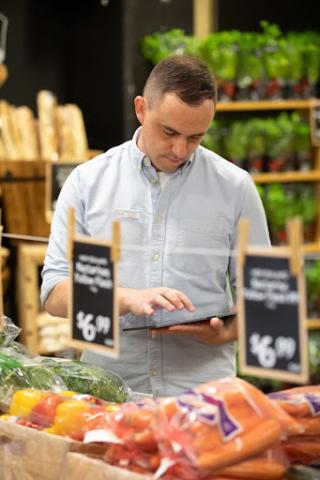
Afresh
Fresh food technology company Afresh wants to eliminate food waste and make fresh food more accessible. Unifying previously separate processes, the company’s artificial intelligence-powered Fresh Operating System empowers grocers to order the right amount of food at the right time by offering a simple, accurate way to manage store-level operations via tablet.
Since 2019, Afresh has prevented 7.9 million pounds of food waste and 3,818-plus metric tons of greenhouse-gas emissions, while saving more than 140 million gallons of water. By the end of 2022, its system will be in nearly 3,300 stores. For its retail partners, Afresh can help reduce food waste by 25% and boost produce operating margins by 40%. In fact, Albertsons Cos. saw such transformative results using Afresh that the Fresh Operating System is now rolling out to more than 2,200 Albertsons stores in 34 states.
Afresh also has plans to offer full fresh replenishment across meat and seafood, prepared foods, bakery, and dairy. Eventually aiming to effect change at the distribution center level as well, the company will drive critical decisions across every step of the supply chain to help companies reach sustainability goals while providing shoppers with fresher food.
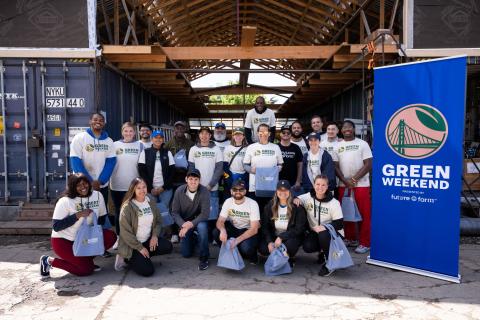
Future Farm
Working with software company CarbonCloud, Future Farm mapped the carbon footprint of its plant-based Future Burger, which is worth 15% of all company sales. Future Farm is now offsetting the emissions in collaboration with ClimatePartner, which helps companies take climate action, to help prevent Amazon deforestation in its home country of Brazil. As a result, Future Burger is now 100% carbon neutral, with the rest of the company’s portfolio to follow.
Additionally, Future Farm is reducing its packaging by 17% and transitioning packs to 100% recyclable materials, including 100% post-consumer recycled plastic, thereby avoiding the use of virgin plastic. Future Farm has also joined the Global Compact Brazil network to work with other companies toward the UN Sustainable Development Goals.
So far, the company has saved/compensated for 748 tons of carbon dioxide on H1’s multidimensional global platform through the carbon-neutral burger. With its packaging initiative, Future Farm will reduce about 100 tons of post-consumption waste.
For the future, the company is focused on building a medium-term sustainability plan based on such global standards as the Sustainability Accounting Standards Board and the Global Reporting Initiative, becoming more involved in global platforms like B Corp, and developing internal policies regarding sustainability and diversity and inclusion.
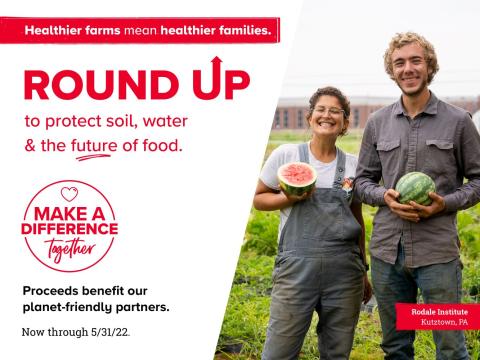
The Giant Co.
In June 2021, The Giant Co. presented its partner Rodale Institute, a global leader in regenerative organic agriculture, with a check for $1.1 million to support organic farm consulting, farmer training and research. Through this program, farmers receive support with their transition to organic farming, and training in regenerative organic agriculture.
The funds were raised through the retailer’s first Healing Our Planet campaign, in 2021, during which customers could round up their checkout purchases to the nearest dollar. The campaign raised $2.3 million, which went to Planet Bee Foundation and Keep Pennsylvania Beautiful as well as to Rodale. Additionally, Giant Co. associates contributed 500-plus volunteer hours toward environmental initiatives and the future of food throughout 2021.
This year, Rodale received a donation of $1,099,208 from the 2022 Healing Our Planet campaign, as well as help spreading its message for World Water Day on March 22. April 2022 was Earth Month at The Giant Co., which again partnered with Rodale, this time to teach students at the Henry Lawnton School in Philadelphia about the importance of gardening, with soil, tools and seeds donated by the grocer.
Through these efforts, The Giant Co. continues to seek new paths toward a sustainable future.
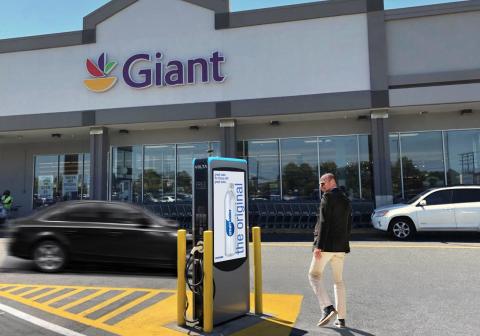
Giant Food
Advocating for sustainable programs and initiatives that support the environment is a key community pillar at Giant Food. The grocer is committed to increasing fresh food donations and healthier choices in-store and online, reducing food and plastic waste, and taking bold climate action in its operations.
Like The Giant Co., its sister Ahold Delhaize USA banner, the grocer works with HowGood, an easy-to-use environmental and social impact rating system that analyzes each product ingredient against various environmental and social criteria, enabling customers to make informed choices when they shop.
Giant Food’s sustainability partners include GreenPrint, a PDI company, with which it collaborated to offset up to 30% of consumers’ vehicle emissions generated from gas sold at its gas pumps and to make the 30th Annual Giant National Capital BBQ Battle 100% carbon neutral for the first time through investments in certified carbon reduction projects; Volta, which offers electric vehicle-charging stations near the front doors of Giant Food stores; and the Alliance for the Chesapeake Bay and the Maryland & Virginia Milk Producers Cooperative Association, both of which the grocer has teamed with on the Giant Clean Water Partnership, helping local dairy farmers improve their land and water to create a more sustainable supply chain.
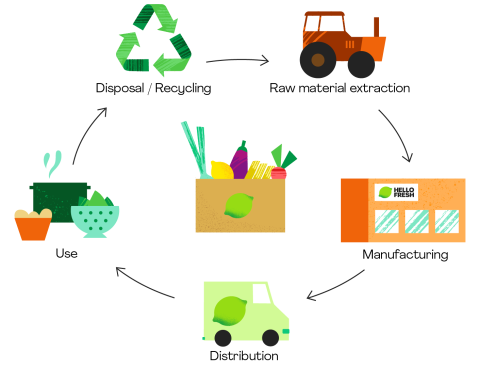
HelloFresh
HelloFresh has been saying goodbye to much of its carbon footprint as it becomes the first carbon-neutral meal kit company. The business has achieved key environmental milestones by, among other things, sourcing 100% of its electricity from zero-emission wind energy and working with local suppliers to reduce emissions related to transportation. To cover emissions from its internal operations, business travel and box deliveries, HelloFresh has purchased carbon offsets for the past two years.
Reducing waste is also a priority. HelloFresh continually works to improve its predictions of customer demand, thereby lowering the amount of unsold and unused food.
While the business treads more lightly on the earth from an energy and production perspective, HelloFresh has also focused on ways to lessen the environmental impact of its products used by consumers. For example, the company plans to help customers make better-for-the-planet meal choices through the increased use of carbon labeling and other sustainability communications.
Recognizing that sustainability efforts require both action and benchmarks, HelloFresh finalized a life cycle assessment (LCA) in April 2022. Conducted by a verified third party, the LCA found that the carbon emissions of HelloFresh meals are 4% fewer compared with restaurant delivery and 31% fewer compared with grocery.
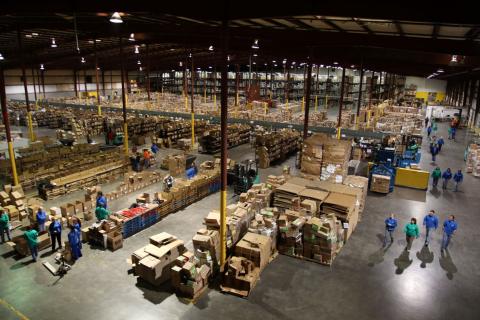
Inmar Intelligence
While a lot of people talk about the impact of e-commerce from shopper need and grocery business standpoints, the rise of the digital marketplace has had a ripple effect on the environment. Heeding the fact that the e-comm return rate is three to five times greater than items purchased in store — and can result in up to 5 billion pounds of items going to landfills each year — Inmar Intelligence is helping to reduce the level of accompanying waste.
One of Inmar’s solutions is an end-to-end returns platform shown to achieve a 99% landfill diversion rate while reducing the consumption of greenhouse-gas emissions, fossil fuels and the release of methane. The platform hinges on a network of processing facilities that combine a human assessment of a returned product’s condition with machine learning to determine the best course of action. Many products can be returned to shelf or inventory through convenient consumer drop-off locations, and later sold at full or a discounted price.
Inmar also teams up with liquidators to sell items through secondary markets and donates goods to charities, to the tune of 51 million items a year. If merchandise can’t be sold, recycled or donated, it can be sent to an energy-from-waste facility to generate electricity.
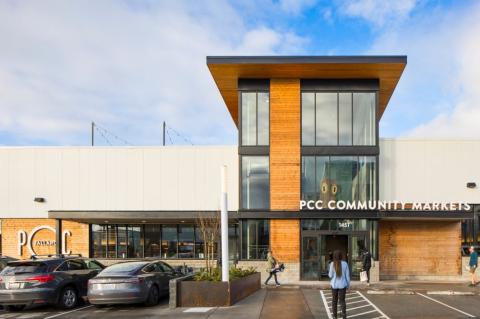
MG2
Depending as it does on cooperation, PCC Markets’ approach to sustainability is a team effort.
From a design standpoint, the cooperative grocery store chain strives to create surroundings that are both inviting and inspiring. Architectural design firm MG2, based, like PCC, in Seattle, worked with the grocer to create a store layout that resembles an open-air market, with local touches that reflect each neighborhood.
For PCC’s location in Ballard, Wash., the co-op and MG2 used building materials that didn’t contain chemicals included on a “red list” of toxic substances. Further optimizing materials, the flooring is made from exposed, polished and sealed concrete, while 100% of the wood is FSC-certified. Heat-, energy- and water-saving features are an intrinsic part of the store design.
Inside, displays are geared toward transparency, spotlighting alliances with local producers. The space is also designed for interaction between customers and staff.
Through their collaboration, PCC and MG2 pursued the goal of achieving Living Building Challenge (LBC) Petal Certification, a high standard for sustainability. They achieved that objective in December 2020, with the store in Ballard, Wash., becoming the first LBC Petal Certified grocery store in the world, paving the way for PCC locations in West Seattle and Bellevue, Wash., to achieve such certification.
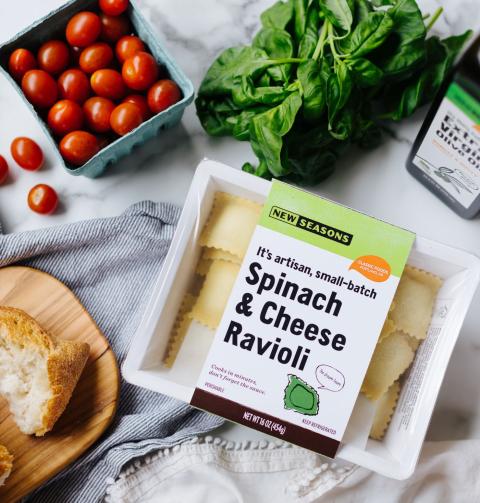
New Seasons Market
As part of its ongoing commitment to mitigate the impacts of climate change from single-use packaging and waste, New Seasons Market recently transitioned its private label Partner Brand Fresh Pasta packaging from plastic clamshell-style containers to an environmentally preferable alternative, PaperSeal MAP trays. This innovative packaging from Graphic Packaging International uses 91% less plastic than traditional plastic packaging and has eliminated more than 120,000 plastic clamshells from the company’s waste stream annually. The new packaging is made from FSC Certified fibers that are fully recyclable once the food-safe liner has been removed. Package labeling tells consumers how to recycle and dispose of all materials properly. In addition to reducing material impact, the trays extend product shelf life from 12 to 20 days, preventing food waste.
Further, last year, the grocer discontinued the sale of single-use water bottles in stores, including 1-liter or smaller bottles of still water in single-use plastic, fiber, aluminum or glass containers. To help customers transition their habits to reusable bottles, New Seasons installed longer water faucet spigots in deli seating areas to ensure that customers could safely refill their own containers. The grocer also expanded its selection of reusable bottles and offered bonus loyalty points to customers shopping with reusables.
3ff7.jpg)
Phononic
Phononic’s Intelligent Actively Cooled Tote, built with a solid-state core and designed with thermoelectric cooling technology, is an innovative way to reduce greenhouse-gas emissions and support climate goals while meeting the demanding performance needs of the market. Available as both a refrigerator and a freezer, the tote protects chilled and frozen food at precise temperatures. It makes quality, safety and freshness possible for grocers while also providing a way to meet critical sustainability mandates.
Using just water mixed with naturally available carbon dioxide as its refrigerant, the tote’s cooling system has a global warming potential (GWP) of 1 or less and is nontoxic and nonflammable. Phononic’s totes work within many different fulfillment systems, including micro-fulfillment centers, grocery curbside, and transport and delivery operations.
Since the tote cools or freezes only the number of customer orders needed, based on demand, it also allows for demand-based energy savings. By leveraging the tote in their fulfillment operations, grocers can achieve an estimated 2.6% reduction in carbon dioxide emissions per store by eliminating the need for dry ice in delivery and transport operations (72% of the savings impact), eliminating high-GWP refrigerant leakage (15% of the savings impact), and reducing energy consumption (13% of overall impact).
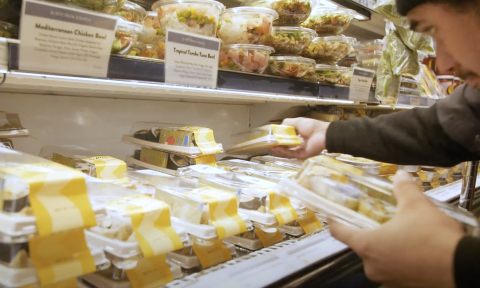
Shelf Engine
Through its mission to reduce food waste through automation, Shelf Engine is working to help preserve the planet by generating the most accurate food orders for supermarkets so they can stock what will sell instead of what will spoil on the shelf. Its predictive artificial-intelligence and machine-learning technology forecast and automate orders of highly perishable products by pairing sales data with real-world and real-time factors and solutions, thereby eliminating human error in the ordering process.
Shelf Engine works with four of the top supermarket chains in the United States, as well as regional and local grocers in more than 3,000 locations, helping them achieve a 32% average food waste reduction, a 7% sales lift and 15% gross-margin expansion. In 2021 alone, the company’s technology helped prevent 4.5 million pounds of food from reaching landfills, which translates to a decrease of more than 7,000 tons of carbon dioxide. In the process, nearly 450 million gallons of water were saved. This year, Shelf Engine aims to expand its location count by more than 200% and triple the size of its footprint in each store through entry into dynamic and challenging new categories of highly perishable products.
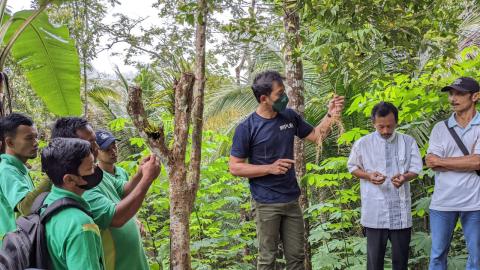
Simple Mills
Simple Mills follows a basic commitment to revolutionary food design that advances regenerative-agriculture principles, elevates farmers, empowers eaters and inspires peers so its food system can nourish people and our planet, now and for generations to come. The recent addition of planetary health to that commitment has driven the cracker and snack producer to ensure that 100% of its new product launches will advance regenerative agriculture through at least one key pathway. Simple Mills is further dedicated to diverse ingredient design, building direct contracts with farmers who prioritize regenerative principles and investing directly in sourcing regions.
As such, the company has formed a partnership with PUR Project, allowing it to source organic coconut sugar from farmers in Java, Indonesia, who implement regenerative agroforestry, intercropping and composting. Simple Mills is also engaged in the Almond Project, which is a five-year study focused on driving proof points for ecosystem benefits in almonds to promote restorative orchard management practices throughout California. For customers, the company provides straightforward, accessible resources on its website to encourage them to learn more and get involved in its mission to create a healthier ecosystem.
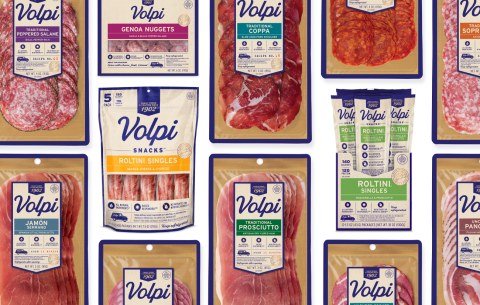
Volpi Foods
Specialty cured-meat producer Volpi Foods is working toward a more sustainable future for its industry through its Raised Responsibly program and its paper-based Eco-Pack packaging. The company’s sustainability-focused standards program ensures animal welfare that allows for natural, free movement; no gestation crates; and no added hormones. Volpi is committed to solely sourcing from nearby farms employing environmentally friendly practices, including working with suppliers to enact additional restrictions that yield a better environment for the animals and a better-quality product.
As demand for pre-sliced meats skyrocketed, Volpi sought out sustainable alternatives to single-use plastic packages, and in 2021, the company converted its entire pre-sliced lineup to Eco-Pack, which marked a first for the pre-sliced meat industry. The packaging has a renewable structure that is distinctive, functional and Forest Stewardship Council Certified, ensuring that the paper material is derived from responsibly managed forests. The packaging also achieves 70%-75% plastic reduction compared with standard deli packs, and the paper material is curbside recyclable once separated from the thin liner. During the 2021 calendar year, Volpi’s switch to Eco-Pack helped divert more than 45 tons of single-use plastic.
Workforce Development/Employee Support
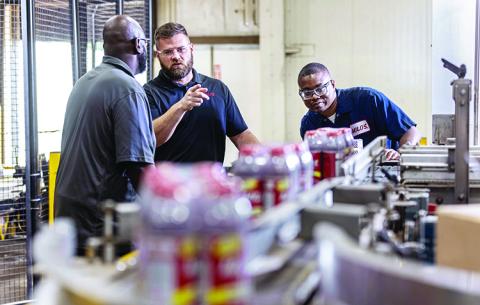
Milo’s Tea Co.
Milo’s believes that by providing associates with the means to learn and grow, it creates a culture of “home” for all associates. In 2021, Milo’s implemented two training systems to give associates the training they want and need: High Performance Work Systems (HPWS) and Milo’s University.
Specifically created for manufacturing associates, HPWS gives participants a clear path for advancement from day one. Through hands-on and written assessments, HPWS creates high-functioning and agile operations facilities where associates are well trained in multiple work areas. In just the past year, Milo’s has seen 509 associates advance through the HPWS process.
Milo’s University is the company’s learning management system that gives all associates access to courses in both soft skills, such as communicating and email writing, and hard skills, such as mastering spreadsheets. In 2021, Milo’s had an internal promotion rate of 71.23%, and so far in 2022, it has promoted 30.19% of associates.
The company is currently in the process of augmenting its new Leaders as Coaches initiative that gives managers the tools to succeed. Milo’s also encourages associates to further their learning outside of the organization by funding conference attendance, certifications and more, as well as providing tuition.
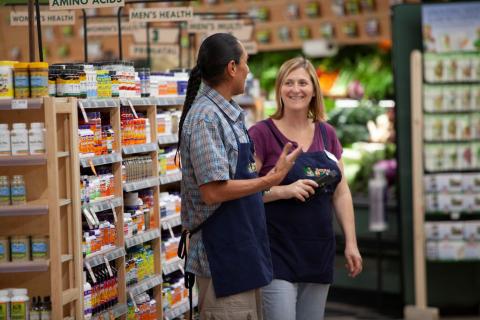
Natural Grocers
Natural Grocers has designed its initiatives to attract, engage, develop and retain its workforce. It positions its employees — known collectively as “Crew” — for success by providing significant virtual and in-person training annually. All Crew receive training in customer service skills, product attributes and nutrition education. New store managers and assistant store managers receive four weeks of in-person operational and managerial training. The Store Manager Accelerated Readiness Training Program is geared toward high-potential candidates who wish to rise to a store manager position. During 2021, Natural Grocers promoted internal candidates to fill 100% of regional manager positions, 87% of vacant store manager and assistant store manager positions, and 78% of vacant department manager positions.
The company’s pay is above federal and state minimum-wage levels for all Crew and includes regularly scheduled pay increases, no pay caps for store Crew who wish to stay in current positions, and birthday pay — given whether the Crew member chooses to work or takes time off. The retailer also offers Crew access to free immune-boosting and stress-busting supplements. Additionally, Natural Grocers created its Heroes in Aprons Fund in 2021 to provide short-term financial assistance to qualifying Crew or their immediate family members who experience hardships.
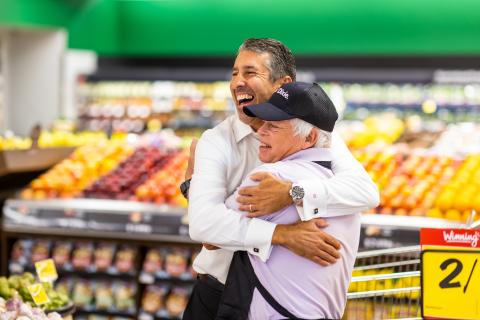
Southeastern Grocers
Southeastern Grocers (SEG) considers itself a people-first organization, and provides associates with a large assortment of benefits, including 401(k) matching, associate discounts, quarterly bonuses and health benefits. The company’s focus on education and advancement is also on display through training programs, scholarships and GED completion programs.
Beyond standard benefits, SEG offers eight diverse resource groups for its associates: African Americans F.O.C.U.S., Asians & Pacific Islanders for Resource and Education, Emerging Leaders, Military Families, Pa’lante (Hispanic Associates and Allies), SEG Pride, the Women’s Development Network, and the Working Parents Network. Additionally, the company’s corporate leadership development platform, dubbed SEG University, provides personal and professional development resources to help associates advance their careers through leadership courses, lunch-and-learn sessions, and other engaging workshops.
The SEG Cares Foundation is an associate-funded nonprofit that has supported thousands of associates facing unexpected hardships since its inception in 2013. The company has been certified as a Great Place to Work for two consecutive years and was the only grocer featured in Newsweek’s Most Loved Workplaces list for 2021, earning high marks for employee happiness and satisfaction at work.
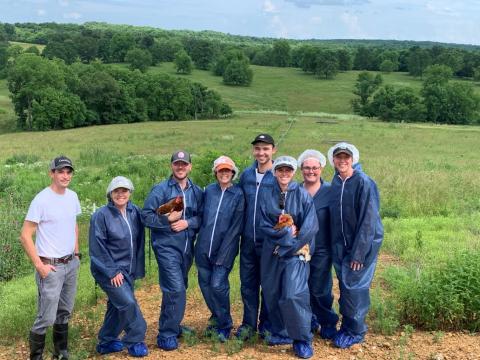
Vital Farms
Vital Farms is a Certified B Corp that prides itself on providing a people-first culture. Through engagement surveys, quarterly feedback, development conversations and culture-building events, the company enables its crew members to grow professionally and personally through a full understanding of their unique needs. Further, the egg, butter and ghee purveyor undertook an employee survey in 2021 that allowed its leadership team to learn more about its crew members’ needs, thoughts and areas for opportunity. The survey found that 96% of crew members believe that Vital Farms found ways to collaborate as a team while working remotely, and 90% of crew members felt supported if they needed flexible working arrangements.
Through further employee engagement and feedback, Vital Farms adopted a permanent remote workforce and also launched Cluck University, an online learning platform that provides extensive training options for both its production facility and remote crew members to improve their functional and interpersonal skills
The company is especially invested in crew safety and well-being, and has taken measures to ensure that its production crew feels valued and engaged by working with local sports medicine trainers to help employees with ergonomics and slip-resistant safety-toe shoes.


